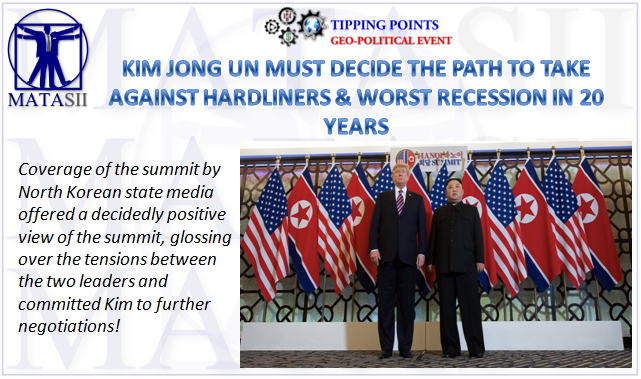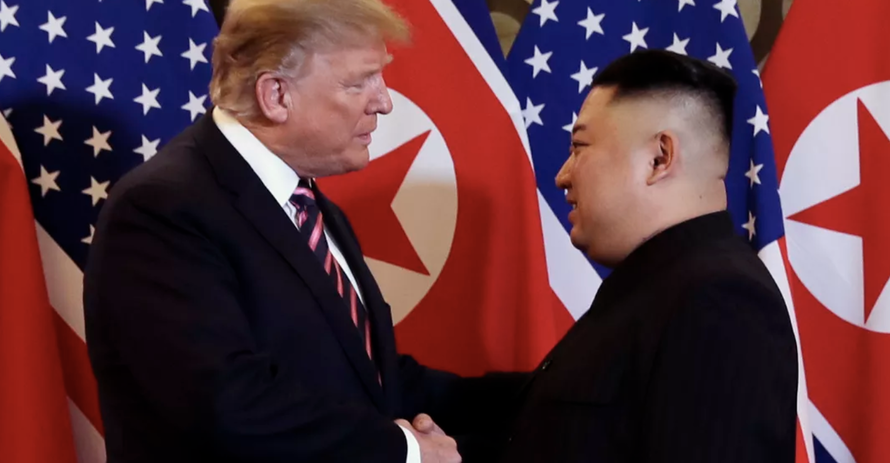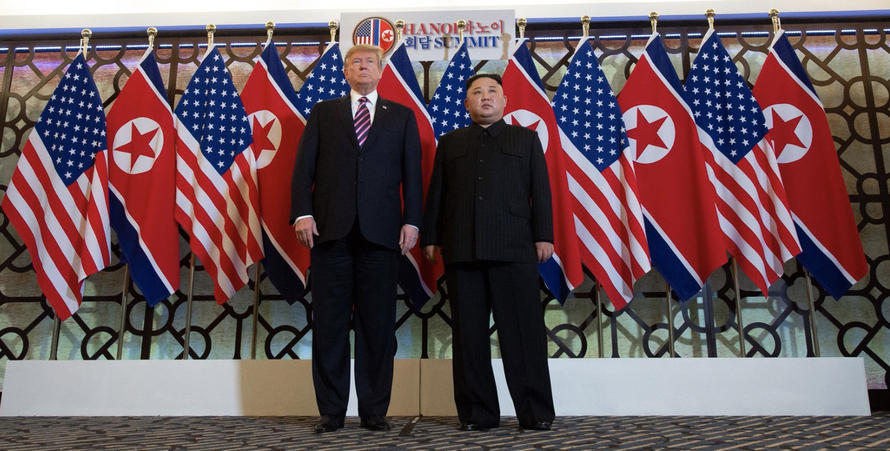KIM JONG UN MUST DECIDE THE PATH TO TAKE AGAINST HARDLINERS & WORST RECESSION IN 20 YEARS
A PUBLIC SOURCED ARTICLE FOR MATASII (SUBSCRIBERS & PUBLIC ACCESS) READERS REFERENCE
SOURCE: 03-01-19 - "Trump Affirms Relationship With North Korea "Very Good": "They Know What We Must Have""
SOURCE: 03-01-19 - "Kim Facing Pressure To Restart Missile Tests After Collapse Of Hanoi Talks"
MATASII SYNTHESIS:
- President Trump appeared to shrug off a warning that Kim may have "lost the will" to continue negotiating
- Instead he insisted that the negotiations were "very substantive" and that the relationship between the two countries remained "very good."
- Offering a degree of validation to North Korean officials' insistence that Kim's staked out a "reasonable" position during the talks - and preempting any speculation that there might have been a miscommunication on par with Trump's summit with President Xi in Buenos Aires Trump said:
"we know what they want and they know what we must have."
- The tweet followed a statement from Beijing urging the partial rollback of some of the UN sanctions against North Korea, as well as a BBG report warning that Kim could face pressure to restart his belligerent missile tests if the country's sanctions-inspired economic recession worsens.
- The country's 25 million citizens are struggling through its worst economic recession in 20 years.
- "Kim also invested a lot in the summit," said Shin Beomchul, director at the Seoul-based Asan Institute for Policy Studies’ Center for Security and Unification. "Kim’s domestic political risk is also high."
- The summit’s collapse reinforced the fundamental choice facing North Korea: Negotiate with the U.S. or force another nuclear crisis to improve its bargaining position.
- President Trump said Thursday that the North had demanded the immediate lifting of all international sanctions - including the six rounds of UN sanctions administered since its 2016 nuclear test in exchange for closing its biggest nuclear facilities under the supervision of US monitors.
Coverage of the summit by North Korean state media offered a decidedly positive view of the summit, glossing over the tensions between the two leaders and committed Kim to further negotiations.
In his first Twitter comment on his relationship with North Korea since senior officials in Kim Jong Un's government contradicted Trump's narrative of why he decided to walk away without a deal on Thursday, President Trump appeared to shrug off a warning that Kim may have "lost the will" to continue negotiating and instead insisted that the negotiations were "very substantive" and that the relationship between the two countries remained "very good."
Offering a degree of validation to North Korean officials' insistence that Kim's staked out a "reasonable" position during the talks - and preempting any speculation that there might have been a miscommunication on par with Trump's summit with President Xi in Buenos Aires - Trump said "we know what they want and they know what we must have."
The tweet followed a statement from Beijing urging the partial rollback of some of the UN sanctions against North Korea, as well as a BBG report warning that Kim could face pressure to restart his belligerent missile tests if the country's sanctions-inspired economic recession worsens.
FULL SOURCE FOR FURTHER DETAILS:
Kim Facing Pressure To Restart Missile Tests After Collapse Of Hanoi Talks
Before beginning the long journey by train back to North Korea - a trip that will give him an opportunity to meet face-to-face with senior Chinese officials, and possibly President Xi himself - Kim Jong Un met with Vietnamese officials on Friday as speculation mounted about what the collapse of the talks in Hanoi might mean, not only for the detente between the US and North Korea, but for the US's trade deal with Beijing.
As analysts parse comments made by senior North Korean officials during a midnight press conference, many fear that Kim might restart his missile tests and revert to his belligerent anti-US rhetoric as the country's 25 million citizens are struggling through its worst economic recession in 20 years.
According to Bloomberg, hardliners in his government believe a more warlike posture would improve Kim's negotiating position. But that doesn't necessarily mean a total collapse of the US-North Korea detente is inevitable.
"Kim also invested a lot in the summit," said Shin Beomchul, director at the Seoul-based Asan Institute for Policy Studies’ Center for Security and Unification. "Kim’s domestic political risk is also high."
The summit’s collapse reinforced the fundamental choice facing North Korea: Negotiate with the U.S. or force another nuclear crisis to improve its bargaining position. While it’s hard to know which path Kim will choose, a hard-line approach risks plunging him back into the diplomatic isolation he experienced before an unprecedented year of summits and red-carpet receptions.
Despite a North Korean vice premier's warning that Kim may have "lost the will" to continue negotiating, it's looking increasingly likely that Kim will keep talking, and possibly benefit from some additional help from Beijing. During a press conference on Friday, Chinese Foreign Ministry Spokesman Lu Kang said the UN should consider modifying the North Korean sanctions regime to allow the hermit kingdom some economic relief.
United Nations Security Council should consider holding a debate to modify sanctions against country, Chinese Foreign Ministry spokesman Lu Kang says.
Lu responds to question in Beijing briefing Friday about breakdown in nuclear talks between the U.S. and North Korea.
President Trump said Thursday that the North had demanded the immediate lifting of all international sanctions - including the six rounds of UN sanctions administered since its 2016 nuclear test in exchange for closing its biggest nuclear facilities under the supervision of US monitors.
Coverage of the summit by North Korean state media offered a decidedly positive view of the summit, glossing over the tensions between the two leaders and committed Kim to further negotiations.
Still, if the North doesn't see some economic relief soon, worsening hardship could strengthen hardliners' demands for a return to a more confrontational approach with the US.
Still, Kim faces his own time pressure to escape a U.S.-led campaign that helped push his already impoverished country into its deepest recession in two decades, according to the South Korean central bank. North Korean diplomats said talks broke down after the U.S. refused to support lifting sanctions imposed since 2016 in exchange for dismantling its aging Yongbyon nuclear complex.
That demand appears to cover five rounds of United Nations Security Council measures approved since North Korea’s fifth nuclear bomb test in September 2016. Those penalties, which would require U.S. support to undo, include everything from restrictions on North Korea’s oil imports to a ban on its export of iron and coal.
Still, China's "strategic decision" to improve its relationship with the North (not to mention the thaw between North and South Korea) suggest that Kim can do more by leveraging his international partnerships to secure more concessions from the US. And though President Trump was willing to walk away on Thursday, should ties between the US and the North completely unravel, he would be forced to walk back all of his glowing pronouncements about Kim, and his boasts about the warming relationship with North Korea being a singular geopolitical triumph.
FAIR USE NOTICE This site contains copyrighted material the use of which has not always been specifically authorized by the copyright owner. We are making such material available in our efforts to advance understanding of environmental, political, human rights, economic, democracy, scientific, and social justice issues, etc. We believe this constitutes a 'fair use' of any such copyrighted material as provided for in section 107 of the US Copyright Law. In accordance with Title 17 U.S.C. Section 107, the material on this site is distributed without profit to those who have expressed a prior interest in receiving the included information for research and educational purposes. If you wish to use copyrighted material from this site for purposes of your own that go beyond 'fair use', you must obtain permission from the copyright owner.
NOTICE Information on these pages contains forward-looking statements that involve risks and uncertainties. Markets and instruments profiled on this page are for informational purposes only and should not in any way come across as a recommendation to buy or sell in these assets. You should do your own thorough research before making any investment decisions. MATASII.com does not in any way guarantee that this information is free from mistakes, errors, or material misstatements. It also does not guarantee that this information is of a timely nature. Investing in Open Markets involves a great deal of risk, including the loss of all or a portion of your investment, as well as emotional distress. All risks, losses and costs associated with investing, including total loss of principal, are your responsibility.





